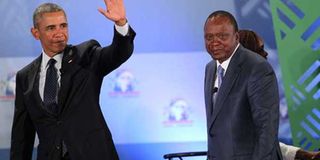What we must do to better our innovations

US President Barack Obama and Kenya's Uhuru Kenyatta at the Global Entrepreneurship Summit 2015 held at Nairobi on July 25-26, 2015. GES 2015 reinforced Kenya’s prowess as the undisputed champion in new technology and an innovation hub in East Africa. PHOTO | FILE | NATION MEDIA GROUP
What you need to know:
- A closer look at some of the innovations paraded by our young entrepreneurs and scholars raised a number of questions, key among them, whether that was really the best that Kenya had to offer.
- Great innovators like The Wright Brothers, Isaac Newton, Alexander Graham Bell, that Scottish engineer who invented the metal detector and made wonderful innovations in telecommunications, and Galileo Galilei, the Italian genius, popularly referred to as the father of modern science, all made breakthrough contributions that helped usher in the scientific revolution.
- Kenya would do a lot better in innovations if we changed our curriculum of education to emphasize on more mind developing topics and subjects.
Nowadays, children buy Chinese made toys for entertainment while those of us born earlier made our own toys”.
The recently concluded Global Entrepreneurship Summit reinforced the widely acknowledged but untold story of Kenya’s prowess as the undisputed champion in new technology and an innovation hub in this part of the world.
However, a closer look at some of the innovations paraded by our young entrepreneurs and scholars raised a number of questions, key among them, whether that was really the best that Kenya had to offer.
At the risk of sounding pessimistic and spoiling the party, my view is that what was on display was way below what a country that is home to M-Pesa, one of the greatest inventions of our time, could offer.
GREAT INNOVATORS
Great innovators like The Wright Brothers, Isaac Newton, Alexander Graham Bell, that Scottish engineer who invented the metal detector and made wonderful innovations in telecommunications, and Galileo Galilei, the Italian genius, popularly referred to as the father of modern science, all made breakthrough contributions that helped usher in the scientific revolution.
These great men did not have the advantages of modern technology, yet their ideas provided the foundation for latter day scientists such as Steve Jobs and Bill Gates.
Our young innovators should not be struggling with such primordial inventions that the likes of The Wright Brothers came up with!
In this 21st century, we shouldn’t be hyping about some nondescript contraption in some village that an overzealous youth calls a helicopter.
What we should be talking about is how best we can harness the brains of that overly ambitious young man and stretch his imagination further with a view to coming up with inventions that can catch the attention and focus of the whole world the way M-Pesa did.
It is not fair to keep standing on the hilltops, shouting about prototypes that would make scientists elsewhere laugh at us.
The science involved with the study, design, and manufacturing of air flight capable machines, and the techniques of operating them has ‘its owners.”
What these ambitious youth should be doing is to make items that would solve the basic problems besetting their people or if they can, refine the machines that are already in the market.
Listening to presenters from outside Kenya, particularly many of those who took the top prizes, one would smell the resilience and energy expended to get them to where they are.
They did not just wake up one day and generate ideas, but rather kept refining them after several attempts and experimentation.
I posit that our education curriculum is not developing the brains of our children in a manner that would enable them to become innovators and inventors to confront modern day challenges.
What do you expect of a mind that is allowed to use a calculator in an examination room?
Their brains cannot store even simple formulae like Pythagoras' theorem.
BASIC PROBLEMS
They cannot solve basic mathematical problems, which their counterparts elsewhere, tackle with ease.
Kenya would do a lot better in innovations if we changed our curriculum of education to emphasize on more mind developing topics and subjects.
The art and crafts subjects that used to be mandatory for our pupils in lower schools need to be brought back and integrated in the syllabus.
Nowadays, children buy Chinese made toys while those of us born earlier made our own toys.
Kenya is a land teeming with sharp brains that can be harnessed to come up with innovations that would tackle most of the basic challenges bedevilling our people without reaching to outsiders for help.





